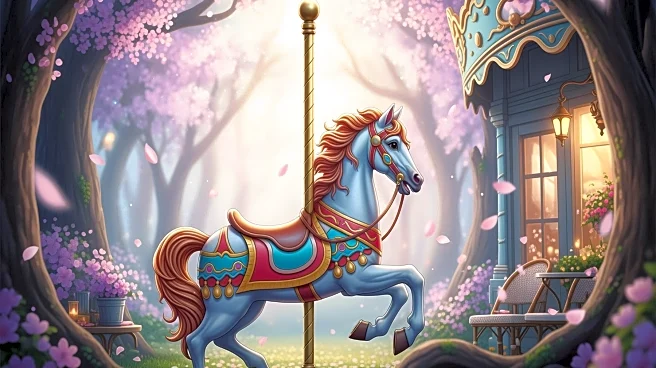What's Happening?
French filmmaker Liane-Cho Han and co-director Maïlys Vallade have adapted Amélie Nothomb's autobiographical novel 'Métaphysique des tubes' into an animated feature titled 'Little Amélie or the Character of Rain.' The film, set to release in theaters,
explores the life of a 2 1/2-year-old Belgian girl growing up in 1960s Japan, who believes she is God and idealizes her family's Japanese housekeeper, Nishio-san. The directors aimed to create a film that challenges its audience, including children, by addressing complex philosophical themes. The production, which lasted only 14 months, involved a team of artists familiar with similar projects, emphasizing thematic depth over form.
Why It's Important?
The adaptation of 'Little Amélie' into an animated film is significant as it pushes the boundaries of children's cinema by introducing philosophical reflections and mature themes. This approach may influence future animated films to explore deeper narratives, potentially impacting how stories are told to younger audiences. The film's exploration of identity and cultural disillusionment resonates with broader societal themes, offering insights into the complexities of cultural integration and personal identity. By challenging traditional storytelling methods, the film could inspire other filmmakers to pursue similar projects, enriching the diversity of content available to audiences.
What's Next?
As 'Little Amélie' enters theaters, its reception will likely influence the filmmakers' future projects and the animation industry at large. Positive audience and critical responses could encourage more adaptations of literary works that tackle complex themes, potentially leading to a shift in how animated films are perceived and produced. The film's success may also prompt discussions among educators and parents about the role of challenging content in children's media, possibly affecting educational approaches and media consumption habits.
Beyond the Headlines
The film's exploration of identity and cultural disillusionment offers a deeper understanding of the challenges faced by individuals navigating multiple cultural identities. This narrative may resonate with audiences experiencing similar struggles, fostering empathy and dialogue around cultural integration and personal identity. Additionally, the film's emphasis on philosophical themes could contribute to broader discussions about the role of animation in addressing complex societal issues, potentially influencing cultural perceptions and artistic expressions.
















